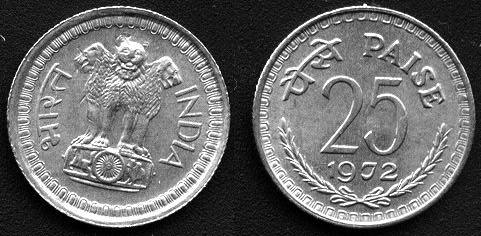Category: International Finance Sub-category: International Finance
Document type: news
According to a government notification, released in December 2010, the 25 paise coin, or the "chaar anna" will cease to be legal tender from June 30th, 2011.
 Every commercial bank which has small coin depots has been directed to accept coins of 25 paise denomination or below, for exchange for their face value at the bank branches up to close of business on June 29, 2011. This facility is also available at the Issue Offices of RBI.
Every commercial bank which has small coin depots has been directed to accept coins of 25 paise denomination or below, for exchange for their face value at the bank branches up to close of business on June 29, 2011. This facility is also available at the Issue Offices of RBI.
With the influx of larger denomination currency notes and coins, the 25 paise coin has practically vanished. None of the 25p coins have been in transaction since 2002, but the crucial reason is that inflation has rendered it useless, at least in the metropolitans.
The cheapest product of Cadbury's is Halls drops, which is priced at 50 paise, and the Eclairs is Re. 1 each. When the sweets that shops distribute when they run short of change are worth more than a coin, you know it's time is up.
The reason for scrapping away the 25p coins as stated was that due to the intrinsic value of the coin exceeding the face value, it was but rational to render them liable to melting and sale by unscrupulous elements.
The economists opine that this is the outcome of negative seigniorage, i.e. when the value of the coins issued exceeded the cost of making it.
The difference in value was accrued to the state. However, if the extrinsic value was lower than the cost of procuring the metals, then this advantage could be reversed.
Rising global prices for coin metals, such as copper, nickel, zinc and stainless steel have resulted in most countries facing negative seigniorage on their small denomination coins.
The Mints across the world are subsidizing the metal recycling business, which has led to bans on the malpractice of melting coins privately by citizens to be sold at higher prices.
The simpler solution is to recognize the reality of the situation and stop minting these coins. The result, as anyone who has been to the US can attest, is the almost ridiculous accumulation of pennies and nickels (the five cent coins which are even larger than pennies, so their negative seigniorage is really high).
External Links:
Seigniorage also spelled seignorage or seigneurage, can have the following two meanings:
- Seigniorage derived from specie-metal coins, is a tax, added to the total price of a coin (metal content and production costs), that a customer of the mint had to pay to the mint, and that was sent to the sovereign of the political area.
- Seigniorage derived from notes is more indirect, being the difference between interest earned on securities acquired in exchange for bank notes and the costs of producing and distributing those notes.
-









